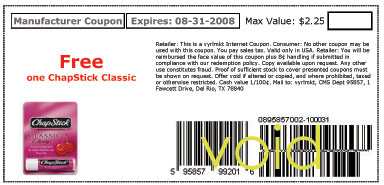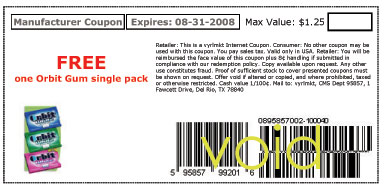I received email today from readers asking how to know when a coupon is fraudulent. It’s a good question, because while the majority of internet coupons are completely valid to use, counterfeit coupons do occasionally make their way onto the net. Usually, the rule of thumb is that if a coupon is offered on the product manufacturer’s website, or on an authorized coupon distribution website, it’s legitimate. But… A bigger problem though is when a valid company declares a legitimate and valid coupon “fraudulent.”
If you think this doesn’t happen, I can give you several examples of it — one just took place this week. Perhaps you heard about the new Facebook coupon application “Check it Out.” This application was created by a company called VyrlMkt (Viral Market, referring to the new media phenomenon that facilitates and encourages people to pass along a marketing message voluntarily.)
Over this past weekend, VyrlMkt released Check it Out, which allowed Facebook users to print coupons directly from Facebook. And they were good coupons! Look at the first two I printed:


Free ChapStick! Free Orbit gum! Who wouldn’t want to tell their friends how to get free stuff? And with that, Check it Out was off to a resounding start. Thousands of people printed the coupons and forwarded the links to their friends. Now when these coupons were released, a few things sent red flags up for me and many others on the net. There were no print limits — you could print as many of these coupons as you wanted. They were also easy to save to your hard drive as PDFs. People contacted VyrlMkt, who repeatedly assured them that yes, these coupons were legit:
“I assure you the promotions are real. If they were fake we’d lose any potential customers like you and no-one would share the offers with friends which is what we all want. There would be no point for us to have invested all this time and money into building this application if all we did was upset people.” – email from VyrlMkt
They wanted users to share them with friends! Fabulous. And people did. Over and over and over. Three days later, VyrlMkt released a story about their site being “hacked.” It turns out that each coupon was linked on their server with a simple name. Imagine “coupon1.html,” “coupon2.html,” and so on. Well, after people saw 8 coupons on Facebook, someone naturally wondered… was there a “coupon9.html”? There was. And putting that URL into the browser yielded even more fabulous coupons.
The trouble was, the coupons in the “hidden” URLs weren’t supposed to be released yet. They were example coupons the company was using to show to investors, and they didn’t have permission from the product manufacturers to offer coupons for their items. VyrlMkt released a notice on Facebook that their site had been “hacked.” Is URL manipulation a hack? Absolutely not. They never should have put those coupons on a live web server where people could find them — and they certainly underestimated the ingenuity of even the average web surfer:
Please be aware that someone has hacked into our development database of our coupon offers, placed our offers in pdf files and is now distributing them throughout the internet. The majority of these coupons were not for distribution. They were strictly to be used for sales and marketing demonstrations. Such offers, because they are copies / reproductions, are considered fraudulent and are not permitted, please do not attempt to use them.
All the offers that were properly printed through our facebook application can be redeemed. ANY copy of any coupon or anything printed or reproduced from any other source other than through the authorized Facebook application may not be accepted at the register. – VyrlMkt
Here’s the problem. Coupons.com and many other sites have print limits and unique bar codes to both limit the quantity of coupons in circulation and identify the IP address of the computer the coupon was printed on. VyrlMkt did none of that. Their coupons looked the same no matter what computer they were printed on. And by encouraging Facebook users to share the coupons with each other (the key component of viral marketing!) people were saving and emailing these coupons to everyone they knew. Hours later, VyrlMkt released recanted their earlier claim that validly-printed coupons could still be redeemed with another statement:
It is an unfortunate but sad reality; however, in order to protect our retailers and all of you responsible coupon users, all coupons will now be considered invalid copies. We are working with all industry players and word is going out to the retailers to not accept them. – VyrlMkt
So now, the coupons that I printed legitimately from Facebook over the weekend are now fraudulent. And in declaring them “fraudulent,” the stores that the coupons were redeemed at will have to fight VyrlMkt to get reimbursed for these — and anyone attempting to use them also risks being accused of coupon fraud. What a mess. People who legitimately printed these coupons earlier in the week and tried to redeem them without keeping track of VyrlMkt’s colossal screwup could find themselves accused of committing a crime. From a PR standpoint, this is a nightmare.
And the sad thing is — this has happened before. A company can issue a completely legitimate coupon and then decide later that it’s “fraudulent” when too many of them are circulating. Let me tell you about Juicy Juice… In the fall of 2007, Juicy Juice had a Scholastic brochure on their website that you could download in PDF form. The brochure was listed in a pull-down menu on the front page of JuicyJuice.com and contained study tips for teachers, parents and children. And on the cover was a fabulous coupon – one free bottle of Juicy Juice:

Now, PDFs are easily saved to one’s hard drive, and they also have no print limits. How many bottles of Juicy Juice would you have gotten? Word spread like wildfire about this wonderful coupon that was hosted right on Juicy Juice’s own site at this address. Well, Juicy Juice pulled the brochure from their site, but thousands of people had already downloaded it. If you click the link above, you’ll see what they replaced it with:
It has come to our attention that there are several counterfeit/unauthorized Nestlé Juicy Juice FREE product coupons being circulated on numerous websites. Please be aware that these coupons were posted without Nestlé’s permission. This offer was never authorized by Nestlé to be distributed via the Internet.
So was it counterfeit? No. Unauthorized? No, it was created BY Nestle! Never authorized to be distributed via the internet? No — they put it on their own website with a link on Juicy Juice’s homepage. And yet, by claiming that it was counterfeit, Juicy Juice ultimately refused to reimburse the stores for the value of the juice that people purchased using their very legitimate, very authorized coupon that they chose to put right on their website. Every store in our area (and likely, most of the country) had a flyer behind the register with a photo of that coupon and a big warning that it was counterfeit and should not be accepted.
Because of this incident, Jewel stores modified their coupon policy, and they’ll no longer accept any internet printables for a free item. Other stores have firm no-internet-coupon policy — and incidents such as this are surely the reason they won’t change that policy anytime soon. Worse, couponers like myself don’t want to see our favorite stores stop accepting legitimate internet coupons because manufacturers have decided to play games when the stores attempt to redeem these valid coupons, simply because “too many” of them got out there.
When are companies going to realize the power of the internet, and how quickly information can spread, especially about a good deal? Here’s another one. This summer, Toys R Us emailed an internet-printable coupon for a free Thomas the Train wooden railway engine to people on their e-mail list. If you have children that are into Thomas, you know that these little trains are ridiculously expensive — and terribly addicting for kids too. A free train at Toys R Us? You bet!

Within 5 days of this coupon’s issue (and you can see how long the coupon was supposed to be valid for) Toys R Us replaced the coupon with this.
Due to an error, the online coupon for a free Thomas train issued on June 19, 2008 is no longer valid.
Due to an error? Or due to the fact that they put a coupon out there with no print security, in a form that everyone could save to their hard drives and print as many times as they liked?
So, all of this brings us back to the question. How do you know when a coupon is fraudulent? It can be hard to know, especially when companies change the rules in the middle of the game and invalidate perfectly legitimate coupons. Now, as we speak, there’s a great coupon out for $3 off of TGI Friday’s frozen appetizers, which just happen to also be on sale for $3 at my favorite store. If you entered a sweepstakes on www.tgifridays.com, you were taken to the printable coupon hosted on the site of their PR firm, Exposure Marketing.
The coupon has no print limit, expires in December of 2008 (at the time of this writing, it’s currently August, 2008) and as many people have pointed out to me, is also easily saved to one’s hard drive. The sweepstakes has been going for a few days. Earlier today, the $3 coupon was replaced with a $1 coupon — and now, when you register for the sweepstakes, you get no coupon. The manufacturer has pulled it off their site. Red flags flying yet? Want to take bets on how long it is before this food manufacturer decides that this very legitimate TGI Friday’s coupon that they themselves issued … is “fraudulent?”










artofthedeal says
I know what coupon your talking about. It looks fake when you print it and it would not scan at Jewel! They took it though. Let me know what you find out ok as it is a really good deal one.
Joe Keeley says
It seems viral marketeers cry “fraud” when the product/coupon they are promoting gets too viral.
After reading your blog on the issue, I can empathize more with stores that don’t want to accept internet coupons or manufacturers who don’t want to honor them.
When it’s a pre-printed (newspaper or mail) coupon, they can control how many discounts or free samples they may give out. But on Internet coupons can have infinite reproductions.
Haileysmom says
Hello,
I was saving this coupon until we had a BBQ and since I also printed $2 off Charcoal and the free KC BBQ coupons last month, I tried to use this coupon at Ultra yesterday. I was given a hard time and ultimately left without my purchase. The first argument from the store manager was that I couldn’t use this coupon because I was getting the BBQ sauce for free. When I explained that it was free to me, but that the store was getting the money from the manufacturer, she changed her argument that because the coupon was not printed in color like the BBQ and Charcoal coupons, it was not valid (she picked up one the color coupons and said “this is how a coupon should look”). After I said that I was allowed to print the coupons in black and white she went to the CS service desk and then came back and said that she would allow my other coupons, but not the one for the meat because it look fraudulent. I just politely declined her offer and indicated I was not interested on any of the items anymore.
I know I read somewhere that there is a site that allows you verify valid vs. a fraudulent coupon. Does someone know the name of this site; I have tried to Google this without success. I would like to email the daytime manager with this information. Thanks so much for any insight you may have.
J.R. says
Woodmans has been taking internet printables for several months now, with certain restrictions.
Bernard2003 says
The toys R Us Thomas the train Q came out LONG before I knew about super couponing.. From this summer – My family actually used it to get my son a few trains for his first birthday! Never heard about them declaring it fraudulent, but I shared a LINK to the Q with my family and gave them the choice to use or not use it…
I went on the FIRST day it was valid and most of their trains were out of stock already! We never had any problems using this Q. However, as you mentioned, it was a PDF file and that might have made the print limit security type stuff hard to use with it. This coupon wasn’t really advertised either – a friend sent me a link to the TRU site so I could get it because she knew I had a little boy who would LOVE the train.
Sure, we used this the way it was meant to be used – one per customer. It’s too bad when people twist a good offer so far that the company has to try and protect themselves this way. This is why I am usually suspicious of the PDF Qs…. the ones with no print limit. Seems like those are the ones most likely to be declared “fraudulent”.
Thanks for mentioning how to check up on these coupons!
hilda_dada says
Thanks for an excellent article! I appreciate your insights and agree with what you wrote.